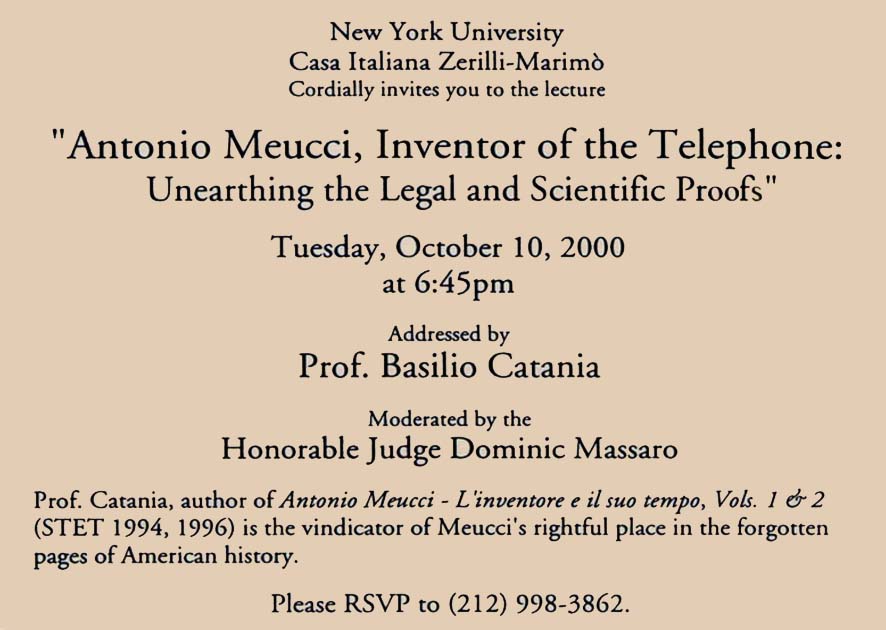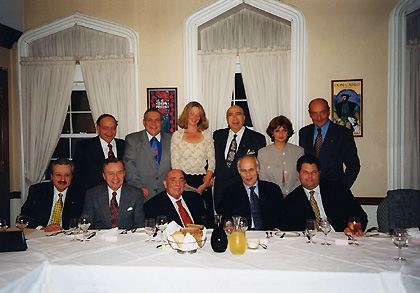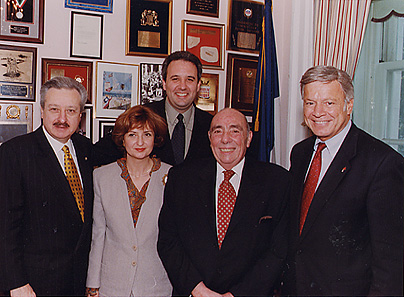
The origin of the epithet "Vindicator," as referred to Basilio
Catania, is from Hon. Dominic R. Massaro, Justice of the Supreme
Court of the State of New York, who first used it in his talk at a
Round Table in Havana, Cuba, on the occasion of the celebration, in
November 1999, of the 150th Anniversary of the first electrical
transmission of speech by Antonio Meucci. He
stated1:
Let me first express appreciation to . . . . Professor Catania, of Turin, the "Vindicator." I have known Professor Catania until this time only through the merit of his Meucci scholarship, but now enjoy the added pleasure of his personality as well as his mind. . . .
Hon. Massaro reiterated his appellative to Basilio Catania, as "Vindicator" of Antonio Meucci, in several other occasions. The next one was in Rome, at a Round Table organized by the Italian-Latin American Institute in June 2000, where he stated2:
Let me first express appreciation to . . . . Professor Catania, of Turin, the "Vindicator" of Meucci. I had known of Professor Catania only through the merit of his Meucci scholarship, introduced to me some years before by my dear friend, Minister Franco Mistretta, now head of the Diplomatic Institute "Mario Toscano" of the Ministry of Foreign Affairs, during his distinguished and well recollected service as Consul General of Italy in New York. That I have collaborated with Professor Catania since Havana is a source of great personal joy and satisfaction.
The third occasion was during Hon. Massaro's presentation of Basilio Catania's lecture at the New York University, on October 10, 2000, where he introduced the latter as "Prof. Catania --author of Antonio Meucci - L'inventore e il suo tempo, Vols. 1 and 2 (STET, 1994, 1996) --is the Vindicator of Meucci's rightful place in the forgotten pages of American history."3:
Later on, in Florence, during a conference celebrating the US Congress Resolution No. 269, upholding Meucci's merits, Hon. Massaro reiterated his above statements as follows4:
. . . . And, of course, [I express appreciation] for the opportunity to see again Professor Basilio Catania, of Turin, the "Vindicator" of Meucci to whom we owe much. I had known of Professor Catania only through the merit of his Meucci scholarship, first introduced to me about 1995. That I have collaborated with him since our 1999 meeting in Havana on the occasion of the 150th Anniversary of Meucci's important discovery there, in 1849, is a source of personal joy and continuing satisfaction . . . . Because of Professor Catania, the true inventor of the telephone emerged from the noteworthy mass of government proofs that he uncovered buried in these never printed pages . .
Consistently with the above, Basilio
Catania's lecture at the New York University
(October 10, 2000) was announced as follows (see the announcement below):
Prof. Catania, author of "Antonio Meucci - L'inventore e il suo tempo," Vols. 1 & 2 (STET 1994, 1996) is the vindicator of Meucci's rightful place in the forgotten pages of American history.

The announcement of Basilio Catania's Lecture at the New York University, 10 October 2000
Shortly after his aforesaid lecture, as well as his reception at the City Hall, many newspapers echoed Hon. Massaro's appreciation. For example, the Italian Voice of New Jersey wrote5:
If the name "Meucci." does not ring a bell, the 150th Anniversary Meucci Memorial Committee with Chairman Dominic R. Massaro, Justice of the Supreme Court of New York, now moves into the phase of its work. The Committee is trying to correct, by restoring to the record, the name of the man it says is the true inventor of the telephone, Antonio Meucci, an Italian immigrant who lived on Staten Island. . . .
Shown is the arrival of the honored guest, distinguished Professor Basilio Catania of Turin Italy, - Vindicator of Meucci! His lecture, "Antonio Meucci, Inventor of the Telephone: Unearthing the Legal and Scientific Proofs" with his Conference at New York University, Casa Italiana (24 West 12 Street, New York City), Tuesday, October 10th, was a momentous occasion and it was imperative that all Committee members be on hand. Representatives from The Italian Voice were in attendance.

Dinner at "Tiro a Segno", New York: Seated from left Hon. Dominic R. Massaro, Chairman, Hon. Frank J. Guarini, Chairman NIAF; Professor Basilio Catania, Hon. Giorgio Radicati, Consul General of Italy in New York, and Paul Pope. Standing from left: Hon. Jack Comb, President Italian American Legal Defense & Higher Education Fund, Martin G. Picilio, Esq. President Tiro A Segno, Katherine D. LaGuardia M.D., Dr. Comm. Joseph A. Zagame, Professor Filomena Ricciardi, translator of Professor Catania's works and Dr. Lucio Caputo, Executive Vice President, Gruppo Espositorio.
A similar reportage was published by The Brooklyn Record6:
The arrival of honored guest, the distinguished Professor Basilio Catania of Turin, Italy, vindicator of Meucci and his lecture, "Antonio Meucci, Inventor of the Telephone, Unearthing the Legal and Scientific Proofs," with his October 2000 conference at New York University, Casa Italiana, was a momentous occasion and well attended by Committee members.
The Golden Lion, of New York, also reported on Basilio Catania's reception at the City Hall, at the Office of the Speaker of the New York City Council, together with Hon. Massaro, J. Calvelli and F. Ricciardi (see photo below), as follows7:

Meeting at New York City Hall: (from left) Hon. Dominic Massaro, Prof. Filomena Ricciardi, John Calvelli, Basilio Catania, and Hon. Peter Vallone
Pictured in photo is Professor Basilio Catania, of Turin (2nd f/ right), vindicator of Antonio Meucci as the true inventor of the telephone. Here he visits City Hall on the occasion of his NYU lecture in furtherance of Meucci's primacy over Alexander Graham Bell. The New York City Council followed by becoming the first legislative body in the United States to proclaim Meucci as inventor. . . . A resolution is soon to be introduced in Congress by Congressman Vito Fossella, of Staten Island, to correct the historic record. Seen on the occasion (all members of the Order, from left) State Supreme Court Justice Dominic R. Massaro, . . . Professor Filomena Ricciardi, translator of Professor Catania's scholarship in America; John Calvelli, Esq., chair of The Conference of Presidents of Major Italian American Organizations; Professor Catania; and NYC Council Speaker Peter A. Vallone.
Though not explicitly containing the epithet "vindicator," the following excerpts are in line with the quotations reported above. One refers to statements by Ms. Anne Covella Alarcon, the former Curator of the Garibaldi-Meucci Museum of Staten Island8:
. . . . Earlier in the day, news of the newly discovered evidence [by Catania] was greeted warmly by Anne Covella Alarcon of New Brighton, curator/director of the Garibaldi-Meucci Museum in Rosebank, where the inventor lived in the second half of the 19th century.
. . . . Ms. Alarcon, who attended the New York University presentation last night, was well aware of the work being done by Catania. She said the professor has produced new evidence in support of Meucci's claim for years. He has devoted the last 12 years to unearthing legal and scientific proof about the invention of the telephone . . . .
The other important quotation is from the Congressional Records, where U.S. Rep. Eliot L. Engel (D-NY) filed two documents9, 10, of which we report two brief excerpts:
Mr. ENGEL. Mr. Speaker, I rise today to bring to the attention of my colleagues the efforts of Professor Basilio Catania of Turin, Italy. Professor Catania is the retired director general of Italy's Central Telecommunications Laboratory, a distinguished scientist, holder of the European Union's first Telecommunications Prize, holder of Italy's internationally acclaimed Marconi Prize. Following years of meticulous research, Professor Catania is now trying to bring to light the merits of Mr. Antonio Meucci, who claimed that he and not Alexander Graham Bell invented the telephone. In October 2000, at New York University, Professor Catania presented "Antonio Meucci, Inventor of the telephone: Unearthing the Legal and Scientific Proofs." 9. . . . I would like to take this opportunity now to insert into the CONGRESSIONAL RECORD excerpts of a lecture of Prof. Basilio Catania that he gave in October 2000 at New York University. I believe you will find it very informative and illuminating. I commend it to all our colleagues. [An extended reportage, covering three pages on three columns of the Congressional Record, of Catania's lecture at the New York University, follows] 10
However, the most formal recognition to Basilio Catania as "Vindicator" of Antonio Meucci has been granted by the Order Sons of Italy in America (OSIA). OSIA National President, Robert Messa, presented Catania an award at an October 12 banquet ceremony in Rome. A press release (also reported below) was issued on November 21, 2001, by the Sons of Italy News Bureau11, where, among other, it was stated that "Catania's discoveries have been published in a number of scientific magazines and have been also filed with the U.S. Congress in support of a resolution12 acknowledging Meucci's merits." OSIA Press Release was broadcast by the following papers:
In particular, the Italian America review commented OSIA's award as follows:
During the visit[ to Rome], OSIA honored telecommunications scholar Dr. Basilio Catania of Turin, Italy, for his research documenting Italian inventor Antonio Meucci's contributions to the development of the telephone. The award was presented to Catania at the delegation's farewell banquet Oct. 12.
In presenting the certificate, National President Robert Messa noted Dr. Catania's 12 years of telecommunications research that has provided significant evidence of rightful claim to the invention of the telephone, as well as Meucci's development of five fundamental techniques of telecommunications.
Based on this, Catania has proved that Meucci's laboratory notebook was not a forgery as had been charged by the Bell Company. Previous research also revealed that Meucci demonstrated his invention, which he called the telettrofono, in 1860, 16 years before Bell was granted a patent. In dire financial straits, Meucci was unable to afford the fees to patent his invention.
Catania's extensive search in about 50 archives and libraries in various countries and his study of their relevant document also uncovered a mass of unpublished information on the suit brought by the U.S. government against Alexander Graham Bell and the Bell Company which would have annulled the Bell patent. Meucci died in 1889 before the government could complete its case, and history all but forgot him until Catania began his research.
Catania's discoveries have been published in a number of scientific magazines and also have been filed with the U.S. Congress in support of a resolution acknowledging Meucci's merits. Catania also lectures on Meucci and has created an Internet site on the inventor (http://www.esanet.it/chezbasilio)
Newsroom
Sons of Italy Honors Basilio Catania as "Vindicator" of Antonio Meucci
Press Contact: Diane Crespy, 202/547-8115 dcrespy@osia.org
For Immediate Release:
WASHINGTON, November 21, 2002 &endash; The Order Sons of Italy in America (OSIA) has officially recognized telecommunications scholar Dr. Basilio Catania of Turin, Italy, for his research documenting Italian inventor Antonio Meucci's contributions to the development of the telephone, an invention generally attributed to Alexander Graham Bell.
The award was presented to Catania at an Oct. 12 banquet ceremony in Rome, during an official visit to Italy by the OSIA leadership. OSIA National President Robert Messa presented the certificate of recognition to Catania for his 12 years of telecommunications research that has provided significant evidence of Meucci's rightful claim to the invention of the telephone, as well as his development of five fundamental techniques of telecommunications.
Based on this, Catania has proved that Meucci's laboratory notebook was not a forgery, as had been charged by the Bell Company. Previous research also revealed that Meucci demonstrated his invention, which he called the telettrofono, in 1860, 16 years before Bell was granted a patent. In dire financial straits, Meucci was unable to afford the fees to patent his invention.
Catania's extensive search in about 50 archives and libraries in various countries and his study of their relevant documents also uncovered a mass of unpublished information on the suit brought by the U.S. government against Alexander Graham Bell and the Bell Company, which would have annulled the Bell patent. Meucci died in 1889 before the government could complete its case, and history all but forgot him until Catania began his research.
Catania's discoveries have been published in a number of scientific magazines and have been also filed with the U.S. Congress in support of a resolution acknowledging Meucci's merits. (See below). Catania also lectures on Meucci and has created an Internet site on the inventor (Chez Basilio).
As the oldest and largest national organization for men and women of Italian descent in the United States, OSIA was a major force behind the passing of a resolution in the U.S. House of Representatives last June, which recognized Meucci's contributions to the development of the telephone.
Last year, OSIA launched a grassroots campaign, urging its members and supporters to write to their congressional representatives in support of the resolution introduced by Rep. Vito Fossella (N.Y.). Now that the House resolution has passed, OSIA is helping to have a similar resolution introduced in the U.S. Senate.
OSIA also owns and operates the Garibaldi-Meucci Museum in Staten Island, N.Y., which is one of only two ethnic museums in the U.S. that are designated national historic landmarks. The museum is the home Meucci once lived in. Meucci's friend, Italian unification leader Giuseppe Garibaldi, also lived here as Meucci's guest for four years. [See http://www.garibaldimeuccimuseum.org/ or call 718.442.1608 for more information on the museum.]
Established in 1905, OSIA has more than 575,000 members and supporters and a network of 700 chapters coast to coast. OSIA works at the community, national and international levels to promote the heritage and culture of an estimated 26 million Italian Americans, the nation's fifth largest ethnic group, according to the U.S. Census Bureau. To learn more, visit OSIA on the Web at http://www.osia.org.
1 Massaro, D.
R., Discourse at the Round Table "Antonio Meucci, su Obra y su
Contexto Histórico", Havana, November 25, 1999. Spanish
translation printed in: Primeros Experimentos Telefónicos de
Antonio Meucci &endash; La Habana 1849-1999 (Aniversario 150),
Sociedad Cubana de Historia de la Ciencia y la Tecnología,
December 1999, p. 135 seq.
2 Massaro, D. R., Discourse at the Round Table
"Firenze-L'Avana-New York: un'azione di verità e giustizia per
Antonio Meucci," Istituto Italo - Latino Americano, Rome, June 7,
2000. Italian translation printed in Incontri 2000 II, Istituto
Diplomatico Mario Toscano, Rome, July 2001, p. 57 seq.
3 Catania, B.: Antonio Meucci, Inventor of the Telephone:
Unearthing the Legal and Scientific Proofs, Lecture at the New York
University, Casa Italiana Zerilli-Marimò, New York, NY (USA),
10 October 2000. Invitation card
4 Massaro, D. R., Lecture at Conference "Antonio Meucci,
inventore del telefono: le prove legali e scientifiche," Palazzo
Vecchio, Florence, December 14, 2002. Italian translation printed in
AEI - Automazione, Energia, Informazione, Vol. 90, March 2003, p.
50-51
5 Wanted: Millennium Justice and Fair Play for Antonio
Meucci, The Italian Voice, Paterson, NJ, Vol. 69, No. 23, November 2,
2000
6 Zagame, J. A., Antonio Meucci &endash; Ma Bell's Papa?,
The Brooklyn Record, Vol. 64, No. 48, December 1, 2000
7 New York City Hall/Garibaldi-Meucci Museum, The Golden
Lion, New York, March-April 2001, p. 9
8 Williams, F., Azzara, M., Who invented the telephone?
New evidence backs Meucci &emdash; Islander's research predating Bell
is detailed in 19th century trial documents, Staten Island Advance,
October 11, 2000, posted in Internet, "Staten
Island Live"
9 Engel, E.: In Recognition of Antonio Meucci &endash;
Hon. Eliot L. Engel, of New York, in the House of Representatives,
Proceedings and Debates of the 106th Congress, First Session,
Extensions of Remarks, May 24, 2001, Congressional Record E931
10 Engel, E.: Speech by Prof. Basilio Catania &endash;
Hon. Eliot L. Engel, of New York, in the House of Representatives,
Proceedings and Debates of the 106th Congress, Second Session,
Extensions of Remarks, September 5, 2001, Congressional Record
E1580-1582
11 Sons of Italy Honors Basilio Catania as "Vindicator"
of Antonio Meucci, Press Release by Order Sons of Italy in
America, Washington, November 21, 2002, posted at http://www.osia.org/public/newsroom/pr11_21_02.htm
12 U.S. House of Representatives, House Resolution No.
269, Expressing the sense of the House of Representatives to honor
the life and achievements of 19th Century Italian-American inventor
Antonio Meucci, and his work in the invention of the telephone,
Proceedings and Debates of the 107th Congress, 1st Session, June 11,
2002 [H.RES.269.EH]
![]() Made with Adobe Dreamweaver®
Made with Adobe Dreamweaver®
Date last modified: 16 August 2010
Top of Page || My Curriculum || Optical Communication || Physics/Information/Bible || Antonio Meucci ||
![]()